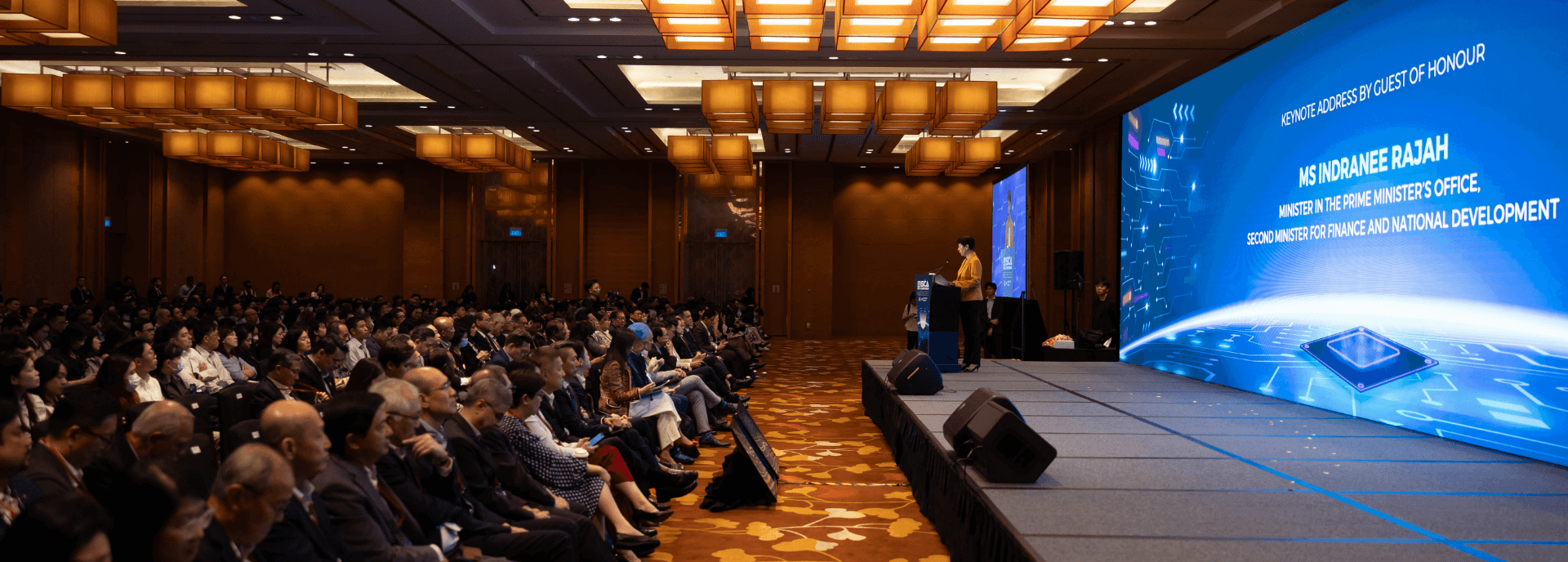
Artificial intelligence (AI) was the main talking point at the ISCA Conference 2023, themed “Artificial Intelligence for the Accountancy Industry” or “AI for AI”.
“Artificial Intelligence, if applied well, can be a force multiplier in modern accounting, helping to analyse financial data to identify insights and detect anomalies,” said Guest-of-Honour Indranee Rajah, Minister in the Prime Minister’s Office, and Second Minister for Finance and National Development, in her keynote speech. “This could free up accountants to move into other higher value-adding areas, like business analytics, forensic audits and advisory work, to support your firms in achieving their business goals,” she added.
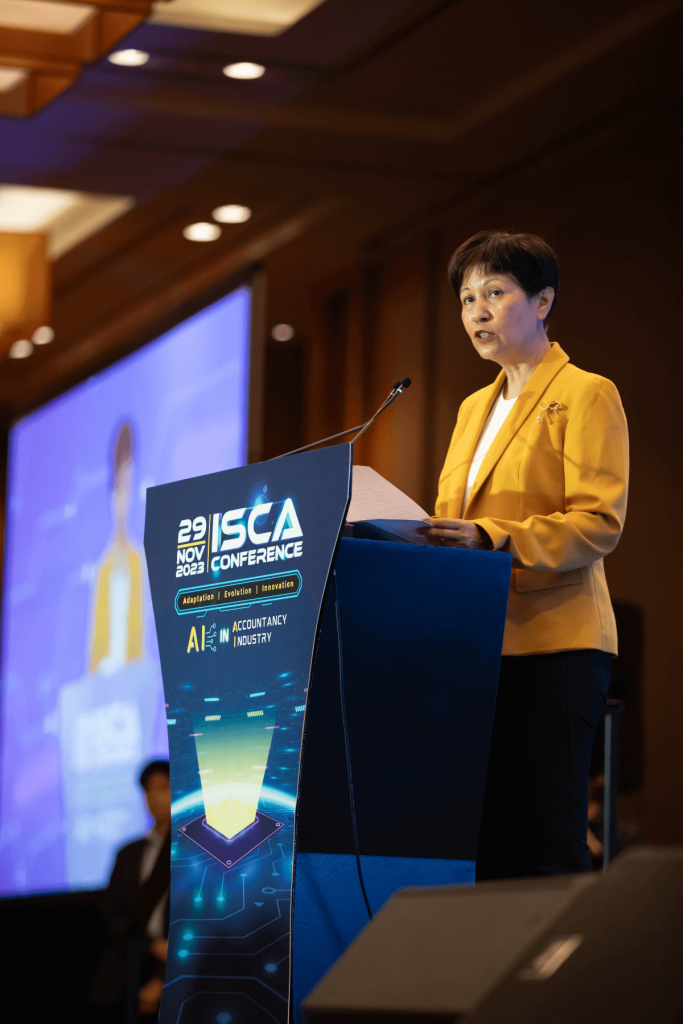
Held on 29 November 2023 at the Sands Expo and Convention Centre, Marina Bay Sands, the Conference saw its largest turnout in 10 years, with over 1,000 attendees. In addition to the disruptive potential of AI, major trends such as sustainability transformation, adaptive fraud prevention and C-suite priorities in the year 2024 were also tabled for panel discussions.
Minister Indranee also announced the launch of ISCA’s Professional Accountancy Hub, formed with 13 other professional accountancy and business services organisations. They include Chartered Accountants Australia and New Zealand (CA ANZ), Chartered Accountants Ireland (CAI), Institute of Chartered Accountants in England and Wales (ICAEW) and Institute of Chartered Accountants of Scotland (ICAS), all of which have existing membership recognition arrangements with ISCA. Other founding members include Association of Singapore Listed Companies (SGListCos), The Institute of Internal Auditors Singapore (IIA Singapore), and The Institute of Valuers and Appraisers Singapore (IVAS).
This new initiative is aimed at building a strong global talent pipeline for the accounting and finance profession at large by harnessing synergies, building a solid knowledge base and deepening stakeholder collaborations among professional accountants, valuers, internal auditors and chartered secretaries, among others.
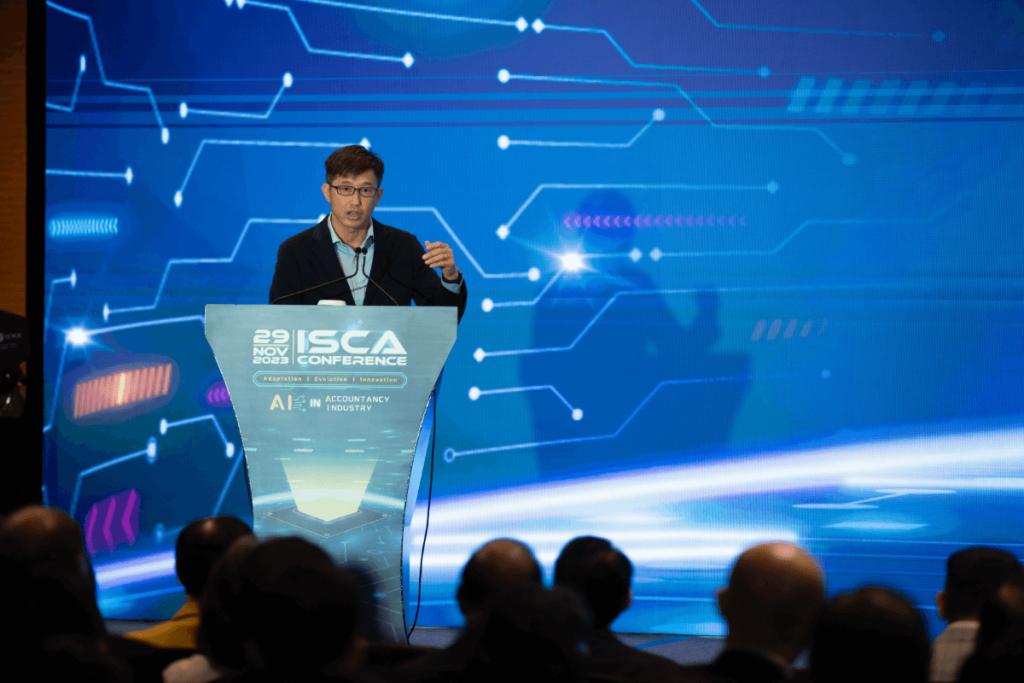
“This highlights ISCA’s resolve to form a strengthened network for professional bodies and associations, collaborate with our peers, and share resources for the accountancy profession and professional services community in regulatory, technical, business and economic developments,” said ISCA President Teo Ser Luck in his opening address. To raise the profile of ISCA memberships internationally, and to support the overseas aspirations of members and local firms, the Institute was on track to establish 12 overseas chapters by the end of 2023. As Mr Teo pointed out, “Be it in business or public accounting, we cannot work in isolation.”
While acknowledging the anxiety some accounting professionals might have at the prospects of being replaced by generative AI, Minister Indranee encouraged the attendees to see technology as a boon and not just a bane. She also shared that ISCA has set aside S$2 million to fund its AI for AI initiative, which will bring together subject matter experts to harness AI’s potential for the accountancy profession.
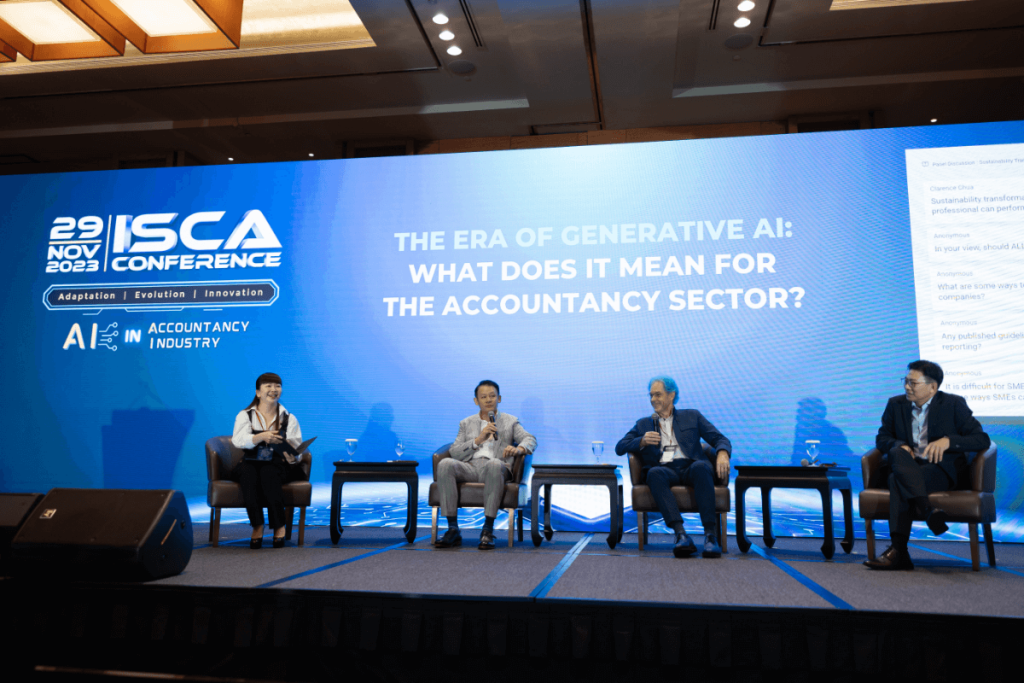
One of the most promising applications of generative AI is in the area of contract management, as it can quickly and accurately spot inconsistencies in contract wording, shared Marcus Lam, Executive Chairman of PwC Singapore. He was speaking at a panel discussion on the risks and opportunities of the disruptive technology, which also included leaders from DBS Bank and Google. Citing an example, Mr Lam pointed out that with AI, sampling sizes can be greatly increased, which will improve fraud detection in cases of roundtripping and incorrect journal entries.
For Derrick Goh, Managing Director and Group Head of Audit of DBS Bank, generative AI has given his team a significant boost, especially when it comes to performing risk assessments and internal audits to identify repeat issues that are not in compliance with regulatory standards. For companies that want to embark on using AI, Mr Goh’s advice is to start small, and to apply AI to issues that they want to resolve first. He added that leaders have a responsibility to get on board with the AI revolution.
Mr Goh sounded a note of caution about the risks associated with generative AI. In traditional AI, someone controls the data inputs, thereby controlling the learning and model optimisation. With generative AI like ChatGPT, there is no control over the sources of learning. The only way to control this risk is to put a human in the decision-making process.
Jean-Michel Coeur, APAC Technology Practice Lead from Google, explained that generative AI can not only process exponentially more data but more types of data, such as content in table format, enabling users to derive the essence behind a data set without depending merely on keywords. This will help accounting and finance professionals better analyse financial statements. As Mr Coeur explained, the principles are the same, but the tool set is different, but they will open the door to opportunities.
Alongside AI, sustainability was a key theme tabled at the Conference. Assistant Chief Executive (Accounting Regulatory and Sustainability Group) of the Accounting and Corporate Regulatory Authority (ACRA) Kuldip Gill shared that sustainability reporting will become mainstream in the years to come, in line with the Singapore Green Plan 2030 to achieve net-zero emissions by 2050. Based on ACRA’s projection, an estimated 5,000 sustainability specialists will be needed by 2027 to plug the talent gap.
In addition, listed companies should prepare to seek external assurance on their sustainability disclosures, as greenwashing concerns grow. Ms Gill further urged companies to approach climate reporting as an investment to create value for their stakeholders and an opportunity to future-proof their business model.
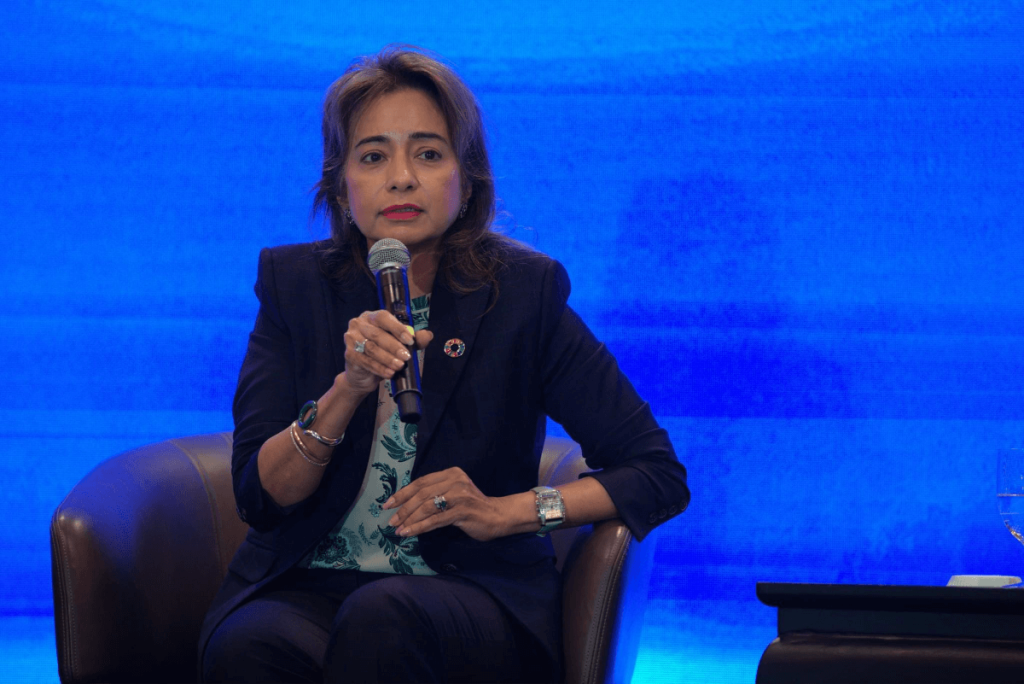
Companies that are willing to take the first step will gain early mover advantage especially in terms of reputation, using sustainability as a differentiator, according to Lennon Tan, President, Singapore Manufacturing Federation (SMF), at the sustainability panel discussion. These companies will also be the first to reduce exposure to regulatory risk, which translates into financial savings, Mr Tan added.
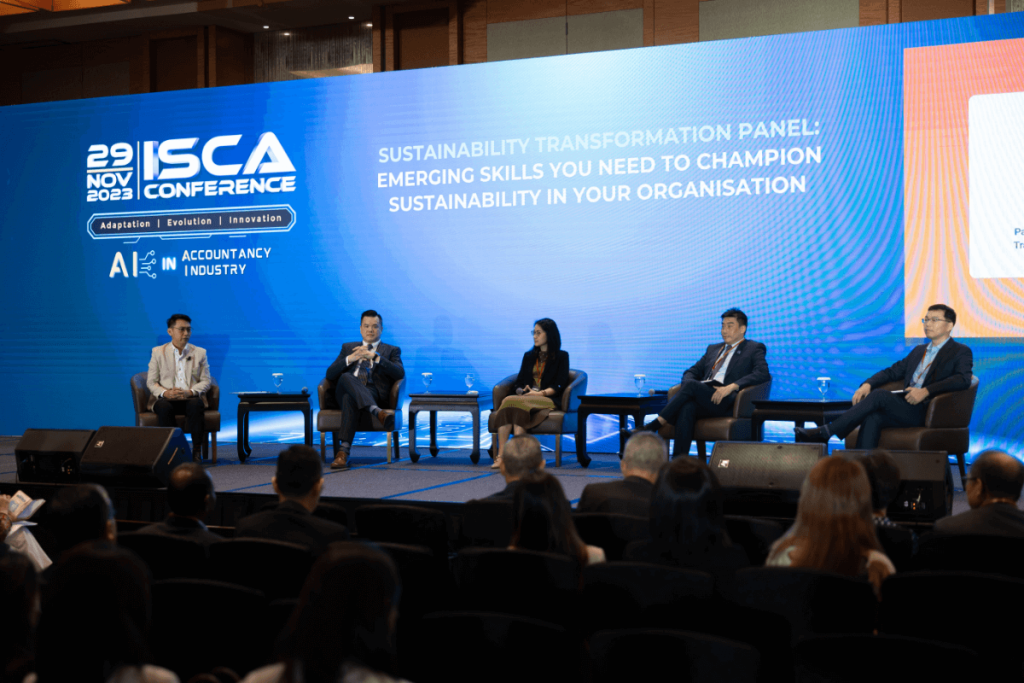
To start, companies should look at areas of material ESG risk and opportunity, such as their supply chains, instead of focusing on all areas of operations at once, which can be quite daunting, noted Dr Joanne Khew, Director (ESG), Eastspring Investments. Her co-panellist, Dr Wang Jiwei, Associate Professor of Accounting (Practice); Programme Director, Master of Professional Accounting and Master of Science in Accounting (Data & Analytics), Singapore Management University (SMU), added that accounting professionals can make a big impact in this context by developing better accounting systems to track and report on key metrics such as carbon emissions, energy consumption and wastage while avoiding double-counting issues. There will also be a need to define proper accounting treatments for instruments such as carbon credits to ensure transparency, noted Brian Ho, Partner, Sustainability and Climate Assurance Leader (APAC and SEA), Deloitte.
But what are some key skill sets needed to advance this sustainability agenda? In the manufacturing sector, which is a key pillar of the Singapore economy, 10 skill sets have been identified. They are:
1) Stakeholder and community engagement,
2) Circular economy and resource efficiency,
3) Carbon and decarbonisation strategies management
4) Sustainability data management and impact measurement,
5) Sustainability reporting,
6) Sustainability risk management,
7) Sustainable finance,
8) Internal audit on sustainability governance,
9) Climate and nature financial implication quantification, and
10) Natural capital management.
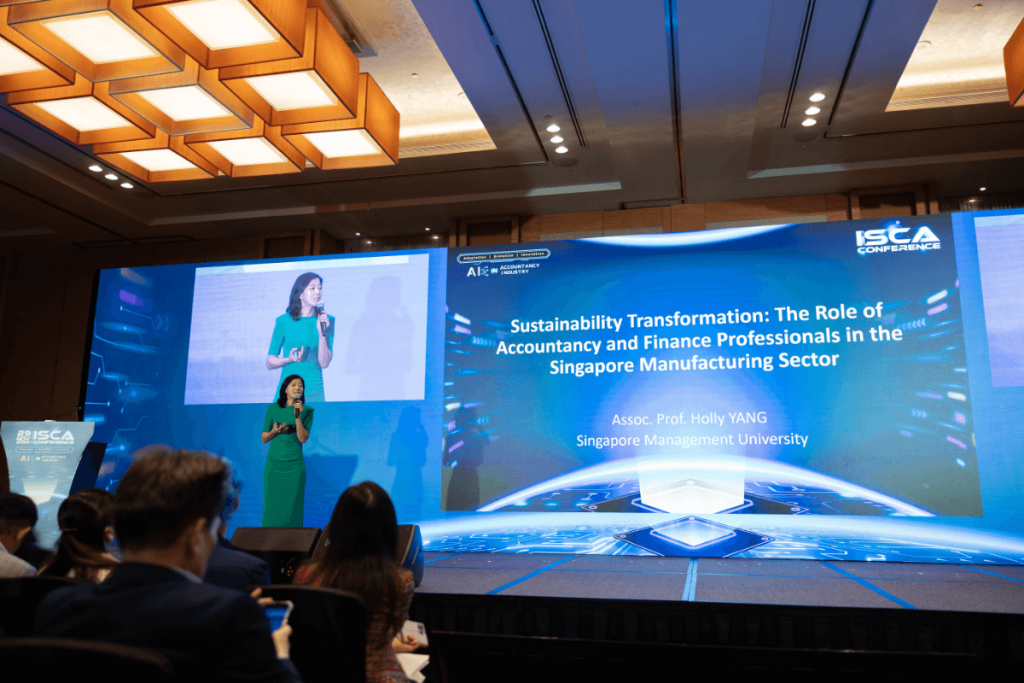
These skill sets were presented by Dr Holly Yang, Associate Professor of Accounting, Co-Director (Academic Research), School of Accountancy Research Centre, Lee Kong Chian Fellow, School of Accountancy, SMU, who referenced Sustainability Transformation: The Role of Accountancy and Finance Professionals in the Singapore Manufacturing Sector, a research report by ISCA, SMF, Deloitte & Touche Business Advisory and SMU. The research also found that while 70% of companies surveyed had started their sustainability transformation in one form or another, only 37% of companies have implemented sustainability initiatives. However, these percentages are expected to double within the next three years, as sustainability becomes an increasingly urgent agenda for businesses and governments worldwide.